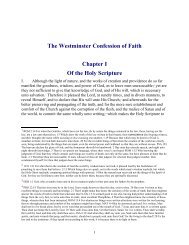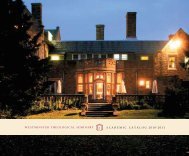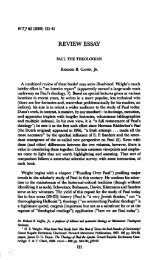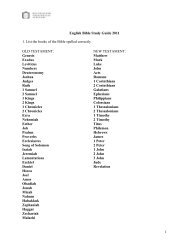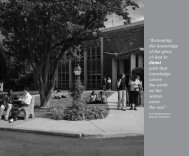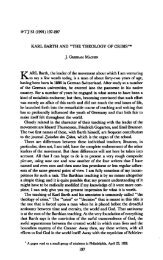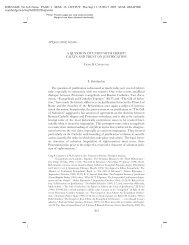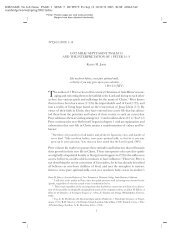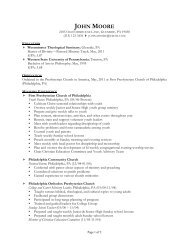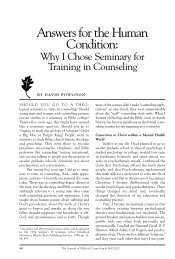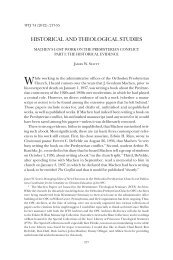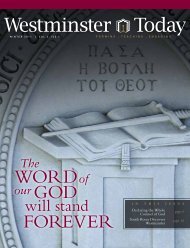2009 - 2010 Academic Catalog - Westminster Theological Seminary
2009 - 2010 Academic Catalog - Westminster Theological Seminary
2009 - 2010 Academic Catalog - Westminster Theological Seminary
Create successful ePaper yourself
Turn your PDF publications into a flip-book with our unique Google optimized e-Paper software.
{Degree Programs}<br />
Doctor of Philosophy<br />
<strong>2009</strong>–<strong>2010</strong><br />
Full-time status means a student must be enrolled in three<br />
courses per semester. (Note that preparation for preliminary<br />
examinations and language examinations are not calculated for the<br />
purposes of full-time status.)<br />
Deadlines for various requirements of the program are as<br />
follows:<br />
• For requirements regarding the first and second language examinations,<br />
see “Degree Requirements,” section 2 (page 89).<br />
• Preliminary exams must be sustained within 3 months of the<br />
end of coursework (no later than three months after the end of<br />
the first semester of the third year).<br />
• Course work must be completed two and a half years after<br />
matriculation.<br />
• Comprehensive exams must be sustained by the end of the<br />
second semester following completion of coursework (no later<br />
than the end of the fall of the fourth year after matriculation).<br />
• The dissertation proposal must be submitted by end of the<br />
semester following comps (no later than the spring of the fourth<br />
year after matriculation).<br />
• The dissertation should be completed within two years of sustaining<br />
the comprehensive exams (submission of the dissertation<br />
by January 15 of the sixth year after matriculation).<br />
Hermeneutics and Biblical Interpretation<br />
Upon initial registration in September, students entering the Ph.D.<br />
program in Hermeneutics and Biblical Interpretation are required<br />
to sustain examinations upon initial registration demonstrating<br />
competence in Biblical Hebrew and New Testament Greek. Failure<br />
to demonstrate competence on either of these examinations will<br />
result in remedial language study and evaluation, supervised by<br />
the examiner, to be completed during the first semester of enrollment.<br />
These language assignments must be completed in the<br />
semester in which they are assigned. Should the student not fulfill<br />
the requirement, the faculty maintains the right to place the student<br />
on academic probation, pending completion of the language<br />
requirement.<br />
Students in the area of Hermeneutics and Biblical Interpretation<br />
must also demonstrate competence in Biblical Aramaic, either by<br />
taking an examination or by passing OT 761 with a grade of B- or<br />
better.<br />
Course Work<br />
A total of fifteen graduate-level courses is required (in addition to<br />
PT 421P). This includes the following:<br />
1. The course PT 421P <strong>Theological</strong> Bibliography and Research<br />
Methodology. This course is required (on a pass/fail basis) of<br />
all students during the first year after the student enrolls.<br />
2. Four area seminars: NT 941 Hermeneutics in the New Testament<br />
Period; NT 981 History of Interpretation; NT 993 Hermeneutical<br />
Foundations; and OT 903 Critical Methodologies.<br />
NT 941 and NT 981 are offered in the fall semester in alternating<br />
years. NT 993 and OT 903 are offered in the spring<br />
semester in alternating years. A full-time student should plan<br />
to take each of these four courses the first time it is offered<br />
during the student’s time of residence.<br />
3. Two directed reading courses: OT 981, 983 Readings in Old<br />
Testament Introduction and Theology, and NT 921, 923 Readings<br />
in New Testament Introduction and Theology. At least one of<br />
these reading courses must be completed by the end of the second<br />
semester of full-time residence. The second must be completed<br />
by the end of the third semester of full-time residence.<br />
4. Nine elective courses to be chosen in consultation with the student’s<br />
academic adviser. With the permission of the adviser, a<br />
student already matriculated at <strong>Westminster</strong> may take courses<br />
at other graduate institutions for elective credit, including<br />
courses at Jerusalem University College. Ordinarily students will<br />
not be granted transfer credit for courses completed at other<br />
institutions prior to enrollment. Study at <strong>Westminster</strong> more<br />
than five years prior to enrollment will also not be counted for<br />
credit.<br />
The student is required to maintain a general academic average<br />
of 3.00 during the program of residency study, and, in addition, a<br />
3.00 average in the five area seminars. If an average of 3.00 is not<br />
maintained, the student will be withdrawn from the <strong>Seminary</strong>.<br />
92



